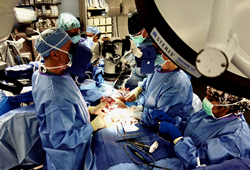
PRMA’s New Recovery Protocol
“Our ERAS Protocol has changed the recovery experience for all of our patients,” shares PRMA surgeon Dr. Chet Nastala.
SAN ANTONIO (PRWEB)
July 23, 2021
Breast Cancer patients have many options for breast reconstruction. Today’s procedures range from implants to using the patient’s own tissue. A common concern surgeons hear expressed from patients considering breast reconstruction is the fear of pain and discomfort associated with the surgery. To combat this fear and to elevate patient care, the world renowned plastic surgeons at PRMA Plastic Surgery have implemented their Enhanced Recovery After Surgery Protocol.
PRMA’s Enhanced Recovery Protocol begins the morning before breast reconstruction surgery and ensures pain control is already in place before the surgery begins. During surgery, an anesthetic known as “blocks” is injected into the surgical site to manage the pain and discomfort immediately after surgery. Typically, all patients need to control their post-operative discomfort at PRMA are Celebrex, Gabapentin, and Tylenol. Many patients choosing to undergo breast reconstruction at PRMA rarely use any narcotics during their recovery.
PRMA’s ERAS protocol also includes a carbohydrate drink patients can consume before surgery. This drink helps the body to process anesthesia quicker and optimizes healing. These new steps have vastly improved patient recovery following breast reconstruction surgery and have decreased hospital stay as well.
“Our ERAS Protocol has changed the recovery experience for all of our patients,” shares PRMA surgeon Dr. Chet Nastala. “The improvement is greatly seen in our patients choosing natural tissue reconstruction options like the DIEP flap. Before the implementation of our protocol, DIEP flap patients would stay in the hospital for up to five days and would be on narcotics for pain control. Now our DIEP flap patients are able to go home from the hospital after only two days and rarely need narcotics for pain.”
Patient stories from PRMA Plastic Surgery reflect Dr. Nastala’s statements as well.
“After researching my options, and talking with my plastic surgeon, I decided to have a bilateral, nipple sparing mastectomy with the DIEP flap reconstruction,” shares breast cancer survivor Wendy Godinez. “After reading the stories of women who’ve gotten implants, and then had them removed for a DIEP, I decided to go straight for the DIEP.”
Godinez says she liked the idea of using her own tissue to ensure her breasts have a natural look and feel while having the cosmetic benefits of a “tummy tuck.”
“I think my actual recovery has gone better than what I expected. I hadn’t realized that my abdomen would be numb, and I wouldn’t feel a thing during the healing process there. Definitely a bonus! I’m deeply impressed with how truly my new, and if I’m being honest, improved my breasts and body look.”
Godinez says that she would highly recommend breast reconstruction to anyone diagnosed with breast cancer.
“It can be scary to think about your body undergoing such a major surgery but, in the end, it’s worth it. I’d suggest they do their research, speak with professionals and survivors, and ask questions.”
About PRMA
PRMA Plastic Surgery in San Antonio, Texas, specializes in state-of-the-art breast reconstruction. Procedures offered include the DIEP flap, SIEA flap, GAP flap, TUG flap, fat grafting, vascularized lymph node transfer, TruSense℠, and nipple-sparing mastectomy. PRMA is In-Network for most US insurance plans and routinely welcomes patients from across and outside the US.
Our Mission
We are dedicated to promoting an environment of compassion, concern and support for every patient regardless of social or economic status and regardless of type of insurance. We will strive to not only support the patient and their family but also to support each other as the ever-changing field of medicine becomes more complex. Honesty and integrity, compassion and caring, make up the foundation of PRMA and at no point shall these principles be compromised.
Share article on social media or email:

